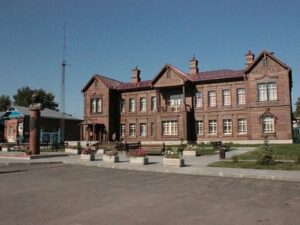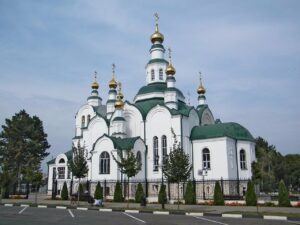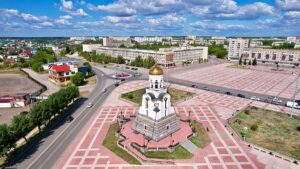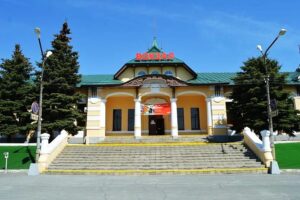Cheboksary: Gateway to Chuvash Culture and the Volga River

Cheboksary, the capital city of the Chuvash Republic in Russia, stands as a cultural and economic hub on the banks of the Volga River. Known for its rich history, vibrant cultural scene, and picturesque landscapes, Cheboksary combines ancient traditions with modern developments, offering residents and visitors alike a unique glimpse into Chuvash culture, history, and natural beauty.
Geography and Climate
Cheboksary is located in the western part of Russia, approximately 650 kilometers east of Moscow, on the northern bank of the Volga River. The city’s geographical location provides fertile plains, forests, and riverside vistas characteristic of the Volga region. Cheboksary experiences a temperate continental climate, with cold winters and warm summers, influenced by its inland location far from maritime influences.
History and Cultural Heritage
Founded in the 15th century as a fortress on the Volga River, Cheboksary has a rich history shaped by its strategic location on trade routes between Moscow, the Urals, and the Caspian Sea. The city played a pivotal role in defending Russia’s eastern borders and facilitating trade with neighboring regions. Throughout its history, Cheboksary has been known for its cultural diversity and traditional crafts, including pottery, weaving, and embroidery, which reflect the unique heritage of the Chuvash people.
Cheboksary’s cultural heritage is reflected in its architectural landmarks, including churches, cathedrals, and historical buildings that showcase a blend of Russian Orthodox, Chuvash, and Soviet architectural styles. The Cheboksary Bay embankment and the Chuvash State Art Museum offer insights into Cheboksary’s past and cultural evolution, preserving artifacts, artworks, and cultural traditions for future generations.
Cultural Diversity and Community Life
Cheboksary is home to a diverse population, primarily comprising Chuvash, Russians, Tatars, and other ethnic groups, reflecting its role as a cultural melting pot in the Volga region. The city’s cultural life thrives with theaters, concert halls, museums, and cultural centers that showcase local talent and historical artifacts. Annual events such as the Cheboksary City Day and the Chuvash Folklore Festival celebrate traditional music, dance, and cuisine, fostering community spirit and cultural exchange.
Landmarks and Attractions
Cheboksary boasts several architectural landmarks and cultural attractions that highlight its historical and artistic significance. The Cheboksary Kremlin, a fortified complex dating back to the 16th century, is a focal point of the city’s historical district, featuring churches, museums, and administrative buildings. The Cathedral of the Ascension, with its elegant domes and ornate interior, is a masterpiece of Russian Orthodox architecture and a place of spiritual reverence.
The Volga River embankment provides a scenic setting for leisure activities, with parks, promenades, and recreational facilities attracting residents and visitors alike. Nearby, the Cheboksary Zoo and Botanical Garden offer educational experiences and conservation efforts, showcasing diverse plant and animal species while promoting environmental awareness.
Economic Hub
Cheboksary is a significant economic and industrial center in the Chuvash Republic, with manufacturing, agriculture, and services driving its economy. The city’s industries produce machinery, textiles, food products, and consumer goods, contributing to regional economic growth and employment. Cheboksary’s strategic location on major transportation routes, including railways and highways, facilitates the transportation of goods to domestic and international markets, supporting trade and commerce.
Education and Innovation
Cheboksary is home to several educational institutions, including Chuvash State University and branches of leading Russian universities, fostering academic research, innovation, and skills development. These institutions collaborate with local industries to promote technological advancement and entrepreneurship, supporting Cheboksary’s transition to a knowledge-based economy.
Urban Development and Sustainability
In recent years, Cheboksary has undergone urban development projects aimed at improving infrastructure, enhancing quality of life, and promoting environmental sustainability. Efforts to modernize housing, transport, and public amenities have transformed the cityscape, while initiatives focusing on environmental protection, energy efficiency, and waste management aim to create a sustainable and resilient urban environment for future generations.
Challenges and Future Prospects
Cheboksary faces challenges such as urbanization, environmental sustainability, and socio-economic disparities, which require coordinated efforts from government, industry, and civil society to address. Initiatives focusing on sustainable development, social welfare, and community engagement aim to create inclusive growth and improve the well-being of all residents.
Conclusion
Cheboksary, with its historical legacy, cultural diversity, and economic vitality, stands as a dynamic city in the Chuvash Republic and Russia. From its origins as a fortress on the Volga River to its role as a center of culture, commerce, and community life, Cheboksary continues to evolve while preserving its traditions and embracing modernity. As it navigates the challenges and opportunities of the 21st century, Cheboksary remains a symbol of resilience, creativity, and progress in Russia’s diverse and dynamic urban landscape.




